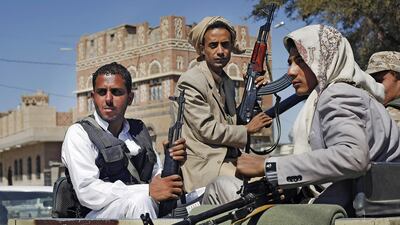United Nations special envoy to Yemen Ismail Ould Cheikh Ahmed met with Iranian foreign minister Mohammed Javad Zarif in Tehran on Monday, a day after holding talks with the UAE's foreign minister in Abu Dhabi.
It comes as the UN mediator looks to achieve a political solution to the nearly three-year-old war after peace talks in Kuwait broke down last year.
At a press conference following their meeting, Mr Zarif and Mr Ould Cheikh Ahmed said they agreed the continued military situation in Yemen would not resolve the situation or achieve peace.
Mr Ould Cheikh Ahmed announced Iran’s support for UN efforts to resolve the Yemeni crisis but said the foreign minister had emphasised the need to resolve the concerns of both sides in the crisis.
Forces loyal to the government of Yemeni president Abdrabu Mansur Hadi — backed by a Saudi-led coalition that includes the UAE — are battling Iran-linked Houthi rebels for full control of the country. The Shiite rebels still hold the capital, along with other areas. Extremists, including local Al Qaeda and ISIL affiliates, have meanwhile taken advantage of the chaotic situation to expand their reach.
----------------------------------------
Read more:
Yemeni, UAE and US forces drive Al Qaeda from Shabwa stronghold
Iran uses new route across Gulf to funnel arms to Houthis in Yemen
Clashes near Yemen's Mokha kill more than 40 troops, rebels
----------------------------------------
Mr Ould Cheikh Ahmed said a military solution to the war had no chance of success and that the conflict, which has now devolved into a humanitarian crisis, will only be resolved with both sides engaging in dialogue.
The Houthis, however, have not welcomed Mr Ould Cheikh Ahmed's efforts, accusing him of having a bias towards the Saudi-led coalition supporting the Yemeni government.
Tehran was the fourth stop on a shuttle diplomacy tour by the UN envoy, who visited Yemen and Oman before going to the UAE.
UAE Foreign Minister Sheikh Abdullah bin Zayed told Mr Ould Cheikh Ahmed at their meeting on Sunday that the Emirates supports reaching a political settlement in Yemen, according to state news agency Wam.
The UAE has been involved in the war in Yemen since March 2015.
Both the UAE and Iranian foreign ministries expressed concern at the humanitarian situation in Yemen, particularly a cholera outbreak which risks infecting millions of Yemenis.
On Monday, the World Health Organisation announced that suspected cases of cholera in the country had reached half a million, while almost 2,000 people had died since the disease began spreading in April.
As part of efforts to relieve Yemen's humanitarian crisis, the Emirates Red Crescent (ERC) on Sunday distributed aid to underprivileged families, orphans and widows in Hadramawt province's Mukalla district in the south-east of the country.
Ahmed Al Neyadi, deputy head of the ERC team in Hadramawt, said the latest food assistance reflected the desire of the UAE leadership and people to help Yemenis overcome the economic difficulties their country is facing.
"The assistance seeks to fill the food gap caused by the difficult economic and humanitarian conditions, which has increased poverty and unemployment among the Yemeni people," he said.
"We will continue our efforts to improve the living conditions of the underprivileged through vital services and humanitarian projects."
The ERC also distributed emergency food aid to underprivileged families in neighbouring Shabwa province on Monday.
The UAE's Armed Forces confirmed on Friday that four soldiers had died in Yemen after their helicopter experienced a technical fault, causing a crash landing. Sheikh Zayed bin Hamdan bin Zayed Al Nahyan, a member of the Abu Dhabi royal family, and two other soldiers were also hurt in the incident.

